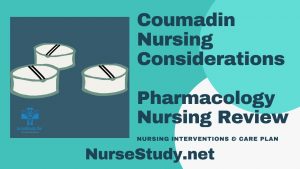Coumadin Nursing Considerations
Coumadin Nursing Implications Coumadin Education for Nurses Coumadin is a prescription blood thinner that prevents normal blood clotting (coagulation). It’s also referred to as an anticoagulant. In many countries, warfarin is sold under the brand name Coumadin. Many people call coumadin “blood thinners,” even though it does not truly thin the blood. Coumadin makes the … Read more





